#gaidhlig
Text
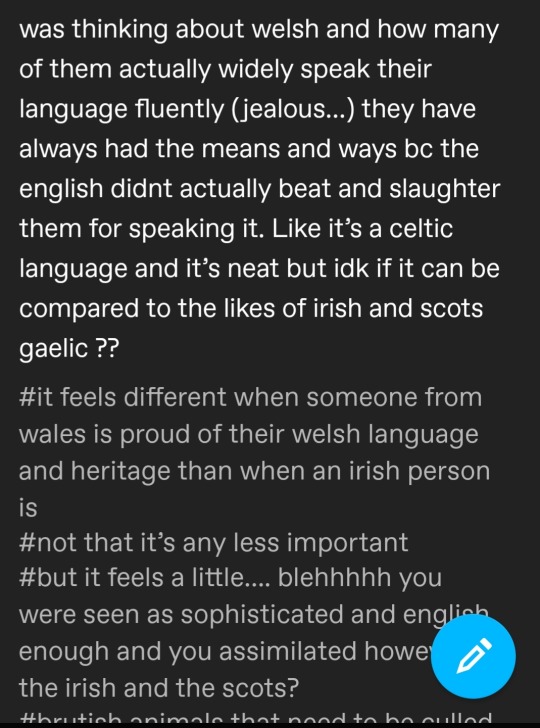
I'd like to preface this with that this is a screenshot of a post I saw a few days ago in the #welsh tag and that the OP has since deleted this post, but the sentiment is something I'd like to address since I see a lot of parallels with this kind of thinking in other contexts, such as in LGBTQIA+ rights conversations.
So, the most obvious elephant in the room is the idea that Welsh is super widely spoken in Wales now and that it isn't in as much danger as other Celtic languages. This idea is wishful thinking at best and erases the very real danger that Welsh is in and that it could be lost just as easily as Irish or Scottish Gaelic. Cornish (which is related to Welsh) actually did die out and has had to be revived. To make a metaphor out of this, we classify languages on a scale of non-threatened to endangered in a similar way to how we classify species.
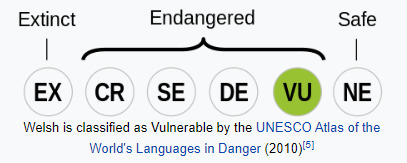
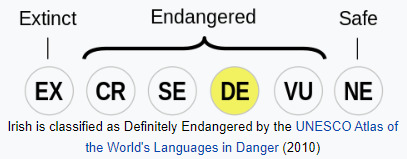
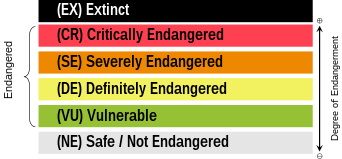
Here are the statuses of Welsh and Irish as of 2010 (above) and the statuses of Lions and Tigers (below).

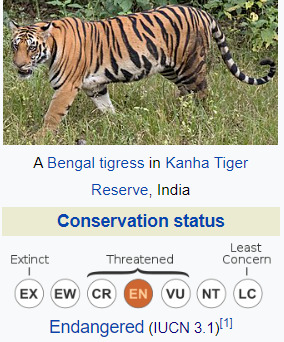
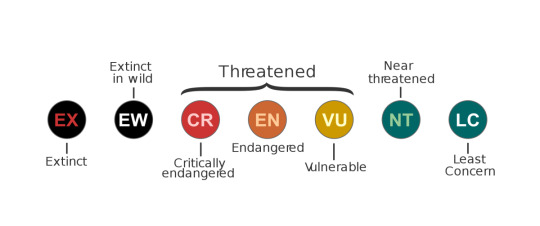
On paper tigers are more 'in danger' than lions. But that does not mean that lions are suddenly not in danger at all. The little bracket above CR, EN and VU labels all of these classifications as threatened. It isn't (and definitely shouldn't) be a competition of 'who is most in danger' because you do not want the thing you care about (whether it be a species or a language) to be in danger.

To come back to the original screenshot "they* [Welsh speakers] have always had the means and the ways because the English didn't beat or slaughter them for speaking it"- on the most basic of levels, this is just incorrect. The Welsh Not was a wooden token hung around schoolchildren's necks if they spoke Welsh in school. If someone else spoke Welsh the Not would be hung around their neck. At the end of the school day, whoever was wearing the Not would be beaten and caned by their teachers. I needn't go into much detail but there have been concerted efforts to beat Welsh out of schoolchildren. With the lions vs tigers metaphor, making the claim Welsh speakers have never been beaten for speaking Welsh because they always had the means and ways, while Irish speakers were beaten and never had the means or ways is like claiming poachers have never shot lions, only tigers. Bottom line is, lions and tigers are both victim to poaching and both species have suffered as a result. Similarly, Welsh and Irish have both suffered language loss and both need conservation efforts in order to survive.
(*sidenote- the consistent use of 'them' and 'they' in the original post is definitely indicative of a 'us vs them' sentiment which is a deeply unhelpful attitude to have when it comes to endangered languages and the Celtic languages in particular)
I see parallels with LGBTQIA+ rights in this situation. When equal marriage came in for gay and lesbian couples in the UK in 2014, many allies began to act like gay rights had now been achieved and that gay issues had been done, they're solved. Except, they really weren't (and aren't). Progress has been made in Wales and undeniably Welsh is doing the best out of the living Celtic languages. But that doesn't mean Welsh has been saved or that full equality for Welsh speakers has been achieved. It very much hasn't. The sentiment of the post in the screenshot is not conducive to helping Irish or Scottish Gaelic. Putting down Welsh speakers and erasing Welsh-language history will not save Irish or Scottish Gaelic. Pretending Welsh has had it easy in some kind of lap of luxury is a deeply harmful and bogus claim.
I'll address the tags under the cut as this post is getting long.
To address the tags, personal feelings ≠ an accurate reading of a situation. Nor is it praxis, for that matter. Why is pride in Welsh different/less good than pride in Irish? Is it the assumed proximity to England? If so, that's a terrible claim to make. Not only that, but Scotland is also next to England- does that make pride in Scottish Gaelic the same as pride in Welsh according to this metric? It's a ludicrous thing to say and deeply insensitive to the needs of Scottish Gaelic and Welsh speakers, who cannot help any current or former proximity to England.
Additionally, proximity to England ≠ worse. I know it's a popular internet joke to hate on England because of English attempts to eradicate the Celtic languages, but when the joke becomes praxis, it does not help. England ≠ a place devoid of Celtic languages either. Many English counties near the Welsh border actually have communities of Welsh speakers, such as Oswestry (Croesoswallt) in Shropshire. Cornwall is also home to many speakers of revived Cornish. It does a disservice to Celtic speakers in England to insinuate that proximity to England taints or corrupts them somehow. This is how ethnonationalism starts and we ain't about that.
And "#it feels a little.... blehhhhh you were seen as sophisticated and english enough and you assimilated however the Irish and the Scots? #brutish animals that need to be culled". So, this is arguably one of the worst things to say about a Celtic language- or any threatened language in general. First of all, the 'you were seen as' - 'you' is very telling. The switch from 'them', 'they' to 'you' indicates that this sentiment is aimed at Welsh speakers directly. This was likely a subconscious thing that OP wasn't thinking about when they wrote this. But it does indicate unhealthy feelings of jealousy and bitterness unfairly directed at Welsh speakers, who are also struggling. This righteous anger at the decline of Irish and Scottish Gaelic would be better directed at efforts to help promote those languages- some useful things to get involved with are LearnGaelic, similar to DysguCymraeg but for Scottish Gaelic or supporting channels such as Irish channel TG4 by watching their programmes.
The idea that Welsh speakers were or are 'sophisticated and english enough' is insulting and carries with it a lot of baggage of how any of these assumptions came about. Welsh speakers were definitely not seen as sophisticated. Where Welsh was 'tolerated', it was treated as a curiosity, a relic of a bygone age. Classic museification which all Celtic languages and cultures suffer from as well. Welsh was not tolerated in any legal sense since 1535- with English becoming the only valid administrative language and the language of Welsh courts after England annexed Wales into its Kingdom. Monolingual Welsh speakers suddenly had no access to any legal representation, unless they learned English. This is no voluntary assimilation- it is an act of survival for many speakers of minoritised languages to 'assimilate' into the dominant culture, or else risk losing access to legal security and other kinds of infrastructure. You need only ask any non-native English speaker living in an Anglophone country what that process is like. Welsh people did not see English incursion as an opportunity to become 'sophisticated and english enough', they had to assimilate in order to survive.
The "Irish and the Scots? #brutish animals that need to be culled" is also painfully misrepresenting a very complex social and political process that unfolded over the span of hundreds of years. The phrasing itself of 'brutish animals that need to be culled' speaks to righteous anger at the damage done to these languages and cultures, but it reinforces negative stereotypes about the Irish and Scots themselves. It also is more complicated than a simple English hatred of anything non-Anglo, since the English conception of particularly the Irish changed a lot over the centuries. It was (and still is) rarely consistent with itself. See: the enemy is both strong and weak. The very earliest Celticists were by and large, Anglos or French.
Ernest Renan (1823-1892) for example, was an early French Celticist who published La Poésie des races celtiques (Poetry of the Celtic Races- English translation) in which he says:
"... we must search for the explanation of the chief features of the Celtic character. It has all the failings, and all the good qualities, of the solitary man; at once proud and timid, strong in feeling and feeble in action, at home free and unreserved, to the outside world awkward and embarrassed. It distrusts the foreigner, because it sees in him a being more refined than itself, who abuses its simplicity. Indifferent to the admiration of others, it asks only one thing, that it should be left to itself. It is before all else a domestic race, fitted for family life and fireside joys. In no other race has the bond of blood been stronger, or has it created more duties, or attached man to his fellow with so much breadth and depth"
Yeah. This guy (unsurprisingly) was a white supremacist. Note that this sentiment is being applied to all people considered Celtic by Renan- Irish, Welsh, Breton, Scottish, Cornish, Manx etc. None unscathed by the celtophobia of the day. In this period, Celticity was romanticised (yet disparaged at the same time). It is less 'brutish animals' and more 'archaic, time-frozen peoples' in this period. Of course, 'brutish animals' attitudes towards Celticity did still exist, but it is disingenuous to act as if it was this attitude alone which drove English celtophobia. Like many things, it is always more complicated and never clear cut as it might seem.
I'll bring this to a close shortly, but returning to OP's suggestion that the Welsh assimilated and the Scots and Irish did not, is also incorrect in that some Scots did have to assimilate to survive as well. The Statutes of Iona (1609) required Scottish Gaelic speaking Highland chiefs to send their sons away to be educated in Scots and/or English in Protestant schools. Many did as the statutes required, which led to further language loss in the Highlands of Scottish Gaelic. These are acts of survival- and not ones always taken willingly.
This has been a long post but it's one which I felt I wanted to address. There's no need for infighting between speakers of Celtic languages over who has it worse. There isn't any answer to that question, nor is it a good use of time or energy. All in all, the Celtic languages have suffered greatly over the years and its only just now that some of them are turning a corner. If you care about these languages, put your energy into something good. Only through active work will these languages be saved for generations to come.
#long post#lukes originals#cymraeg#gaelige#gaidhlig#Irish#Welsh#Scottish Gaelic#politik#not dictionary related#Celticist#Celtic Studies#This took a lot of energy to write so if you found this post useful please consider reblogging
1K notes
·
View notes
Text
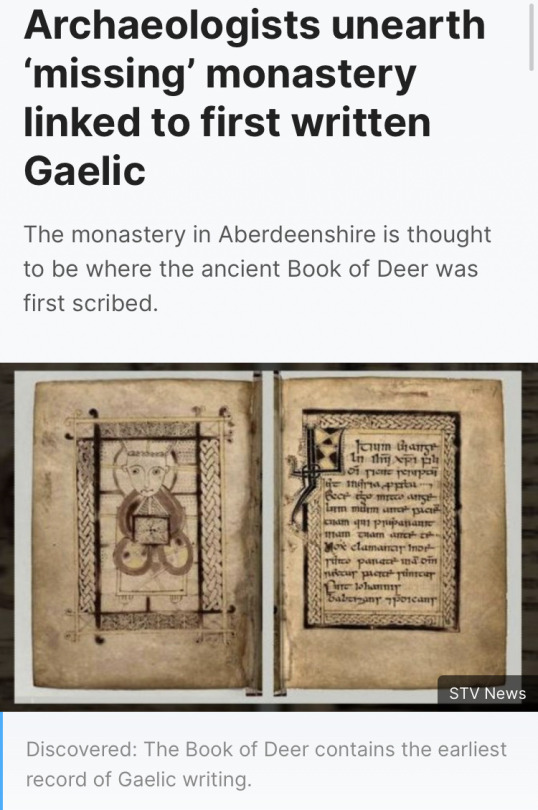
Very cool.
Article here
904 notes
·
View notes
Text
The University of Aberdeen is Shutting down it's Language Department
Hi tumblr, I know I have not been here for very long but I have something important to share,
My university has anounced it's intention to shut down their department for modern languages. As a language student at the Univerity of Aberdeen, this is something very dear to me.
The school of languages at aberdeen includes 8 modern languages, including the minority language that is Scottish Gaelic. In cutting out language and culture education, the university is making a statement of disregard not only to the world around them, but also to one of Scotland's native tongues.
These are language programs that have existed for more than a century, with French and German being taught since 1898, Spanish since 1924 and Gaelic has been part of the University since 1495.
I would like to word all off this well, but I am stressed about about exams at the moment, as well as stressed out if I will be able to pursue the accademic carreer I wanted after I finish my undergrad....
could you please take a look at the petition? maybe sign it, maybe share it? it'd mean a lot. It is going to be presented to the board of directors.
https://chng.it/pfL7RDqfMh
#callingchris#card2karl#greetings2george#saveuoalanguages#Aberdeen#gaidhlig#languages#help#petition#university#academics#university of aberdeen#scotland#bad news
568 notes
·
View notes
Text
Making a separate post because it bothers me but "gaelic" is not the name of "the scottish language", it's an umbrella term for the celtic languages of Gaeilge (Irish gaelic) and Gàidhlig, the scottish gaelic, not language.
(Not be confused with the brythonic branches of celtic languages such as Welsh, Brezhoneg, or Cornish.)
#languages#gaeilge#gaidhlig#celtic languages#gaelic#linguistics#yes this is about the hozier garlic post#butchered tongue#minority languages#indigenous languages#celtic nations
267 notes
·
View notes
Text
The number of americans and non-gaelic speakers saying that its either over-reaction at how many of us are taken aback by this, or feel "vindicated" that their pronounciation was right all along, just know; This has now overtaken the actual, irish and scottish gaelic pronounciation resources
This is not over-reacting, its a legitamite justified response to another example of some american cunt team deciding that instead of being faithful to a culture a media is borrowing from and exposing new people to it, they bastardise a term, and now, god knows how many people are going think the mispronounciation is real, and will feel justified in future ignorance when exposed to our languages
The original japanese is actually accurate. Thisis literally just another case of yankee localisers deciding to fuck with another aspect of gaelic folklore and language to be palatable for monolglots and anglophones. This is another small thing in the pile of small things thats made Gaelic of any variety viewed as either a joke, "broken" english or just gibberish by outsiders. When so many of us who speak our mother tongue have to constantly deal with yanks and brits boosting incorrect info and whitewashing actual aspects of our folklore that people might actually find interesting
Its "Kat-shee", or "Ke-at-shee"
Ar son Dé. Le do thoil. Stop é seo a dhéanamh.
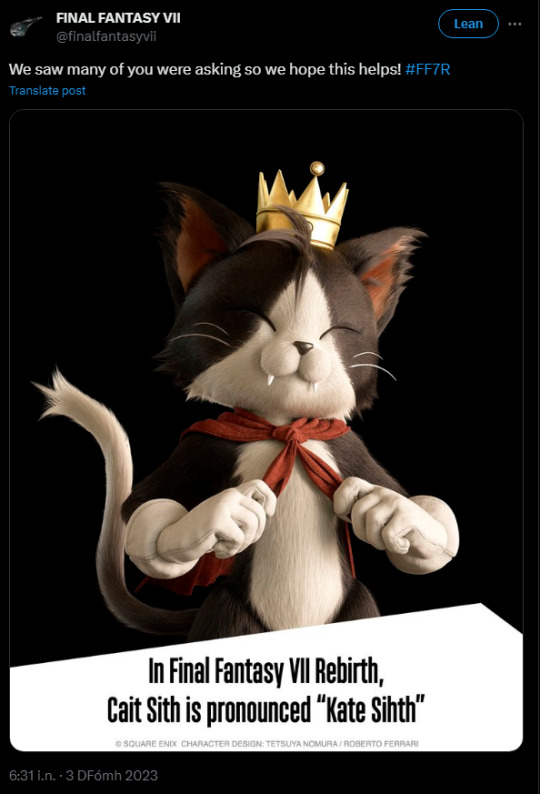

151 notes
·
View notes
Text
I love being in a large fandom because on a whim I decided to see if there were any fics (like at all) in Scottish Gaelic (Gaidhlig), and the first one is a freaking wolfstar fic. like what are the odds?
#shoutout to Caoraich Dhubha by cesario12#ur a real one#am I anywhere near being able to read it?#nope!#doesn't look too bad tho#wolfstar#wolfstar fics#marauders era#fanfiction#sirius black#remus lupin#scottish#scottish gaelic#gaidhlig#language learning
60 notes
·
View notes
Text
Because people keep reblogging my shit and tagging it "Irish"
Íf thé áccénts gó thís wáy ít's Írísh
Ìf thèy gò thìs wày ìt's Scòttìsh Gàèlìc
Also Irish underwent spelling reforms a while back which removed a lot of silent consonants, while Gaelic did not
Eg: oíche vs oidhche (night), rí vs rìgh (King), sú vs sùgh (juice)
#and if it looks like an Englishman tried to write Irish it's Manx#gaidhlig#gaelic#scottish gaelic#celtic languages#irish#gaeilge
776 notes
·
View notes
Text
It'd be cool to come up with Pagan alternatives to the days of the week in the Gaelic languages, since the current ones have such Christian meanings
DiLuain can stay since moon worship is a thing, but perhaps we might change the Latin to "Latha na Gealaich"?
DiMairt could be "Latha na Mhór-ribhinne" (The Morrigan's Day) in keeping with the "M" sound of "Mairt"
DiCiadain needs to go since it refers to a Christian fast, so why not make it Latha an Daghdha? (A sort of oblique reference to Wednesday being "Wodan's Day" in English perhaps?
DiarDaoin again refers to fasts, so maybe "Latha Lùgha"?
DihAoine, another fast, so how about "Latha Aoidh" since it sounds kinda similar to "aoin"?
DiSathairne isn't Christian so much as the wrong kind of pagan, so I'm not against leaving it as is, but as long as we're going with new names, why not "Latha Manannain"?
DiDòmhnaich is perhaps the most explicitly Christian, but since we have "Latha na Gealaich" already, I propose substituting "Latha na Gréine"
I was obviously a bit inspired by the Germanic names here, but I'm curious to see what everyone else's thoughts are! I came up with these off the top of my head, so I make no guarantees about their appropriateness or linguistic accuracy (I'm a Gaelic learner, not a fluent speaker).
#gaelpol#gaelic polytheism#gaelic paganism#scottish gaelic#gàidhlig#gaidhlig#paganism#pagan#an dagda#the morrigan#lugh#aed#manannan mac lir#ireland#irish mythology#gaelic mythology
49 notes
·
View notes
Text


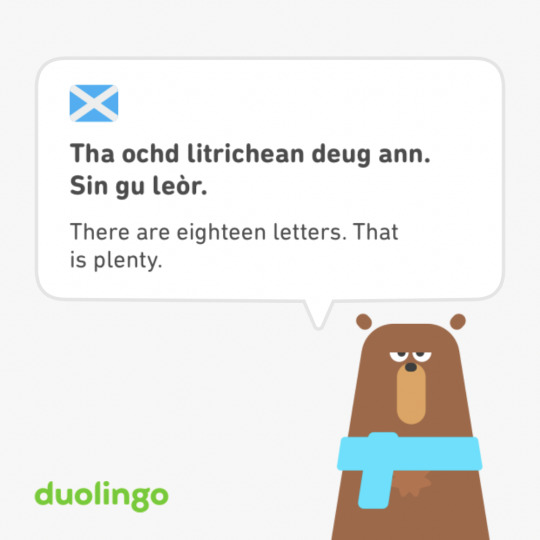
Got these sentences all in one practice lesson in Duolingo
#duolingo#gaelic#scottish gaelic#gaidhlig#gàidhlig#screenshot#screenshots#language#language learning#languages
16 notes
·
View notes
Text
I need more people to appreciate how beautiful Gàidhlig singing is
28 notes
·
View notes
Text
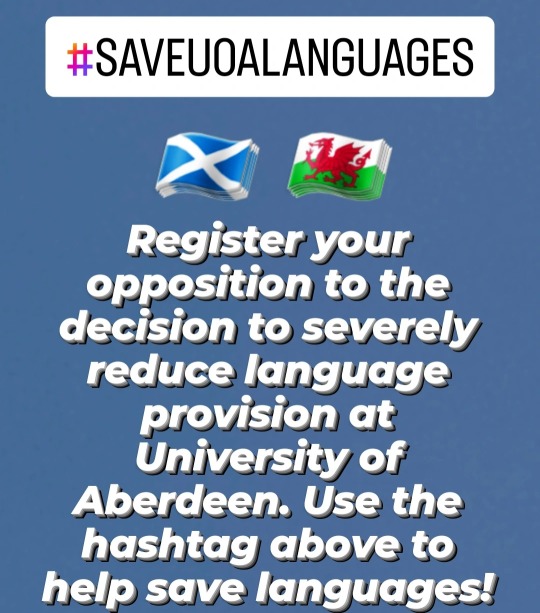
I'm making my opposition to the proposal to severely reduce language provision at the University of Aberdeen known - Scottish Gaelic, an endangered Celtic langauge, is one of the languages at risk of being cut. This would do immense damage to the language revitalisation effort. @uniofaberdeen must reverse this decision and commit to protecting Gaelic and other languages in their institution.
If you feel the same way, you're encouraged to make more posts and stories about the issue to show the University of Aberdeen just how much this decision is frowned upon. Use the hashtag #saveuoalanguages in your posts to get the word out about this.
I'll be travelling tomorrow and wish I could do more right now. But together we can make it known just how unpopular this decision is.
#university of Aberdeen#saveuoalanguages#scottish gaelic#gaidhlig#endangered languages#celtic languages#celtic#gaelic#scotland#scottish#language revitalization#cymblr#celtic studies
123 notes
·
View notes
Text

Life goal: Learn to compliment someone’s thick, juicy ass in Gàidhlig✅
999 notes
·
View notes
Text

I realized I never posted this, so here's a redesign I did of my spidersona!
Damhan-Allaidh means 'Spider' in Scottish Gaelic!
#spidersona#spiderverse oc#spiderverse fanart#spiderverse#spiderman oc#damhan-allaidh#gaidhlig#scottish#into the spiderverse#across the spiderverse#self insert
29 notes
·
View notes
Text

Some old jeans and some acrylic paint and a Gaelic version of a good slogan.
45 notes
·
View notes
Text
I think we should all start saying "obh obh" more
16 notes
·
View notes
Note
is that gaelic in your intro post? (excited bc i'm actually learning it)
tha! tha mi ag ionnsachadh Gàidhlig cuideachd!
i've been learning Gàidhlig in my spare time very casually but i still wanted to include bits where i can :)
thank you for sending this ask! it's lovely to see other people are also interested in the language!
23 notes
·
View notes